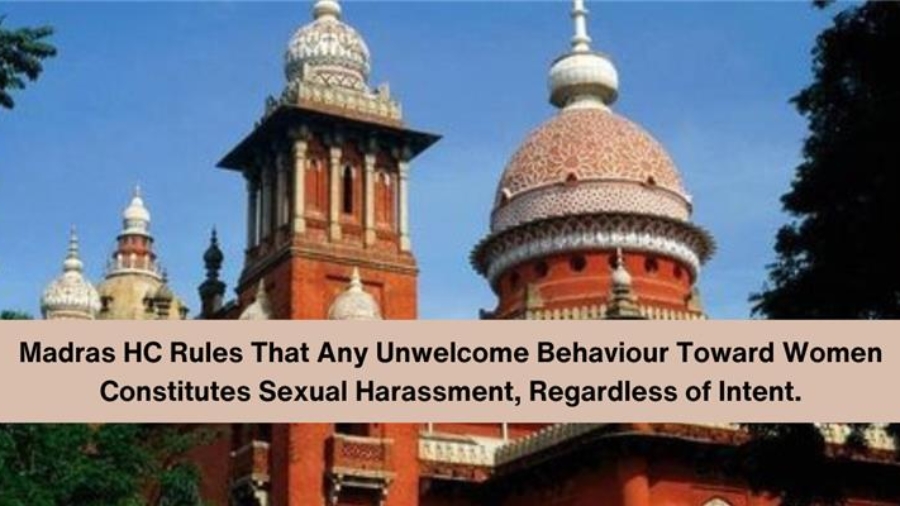Madras HC Rules That Any Unwelcome Behaviour Toward Women Constitutes Sexual Harassment, Regardless of Intent.
Facts of the Case:
This writ petition has been filed challenging the order of the Principal Labour Court, Chennai. The Standing Order Appeal was preferred by the respondent to set aside the recommendations of the Internal Complaints Committee (IC) of the petitioner’s company furnished to him on 30.08.2018.
The respondent was employed in the petitioner’s company as an Associate General Manager pursuant to the appointment letter dated 28.03.2016. The petitioner’s company had constituted an Internal Complaints Committee (IC) under the provisions of the Sexual Harassment of Women at Workplace (Prevention, Prohibition and Redressal) Act, 2013 (POSH Act) to address workplace harassment complaints. Within a short period of his employment, the respondent was subjected to two separate inquiries before the IC following allegations of sexual harassment.
In 2017, the IC found him guilty of inappropriate behaviour under the POSH Act. Despite this, further complaints were received from multiple female employees. Specific complaints included unwelcome physical contact, inappropriate verbal interactions, and intrusive personal questions. Based on these complaints, the IC conducted an inquiry and found the respondent’s behaviour amounted to sexual harassment. The IC recommended that he be removed from any supervisory role, restricted to working within India, and denied a pay rise or related benefits for two years.
The respondent challenged the IC’s findings before the Principal Labour Court, which reversed the IC’s decision on the grounds that the respondent was not given a fair opportunity to defend himself. This led to the present writ petition challenging the Labour Court’s decision.
Contention of the Petitioner:
The petitioner argued that the Labour Court exceeded its jurisdiction by interfering with the IC’s recommendations. He contended that the IC’s recommendations had already been implemented on 31.08.2018, and the respondent was terminated on 12.07.2019. However, the respondent challenged the IC’s recommendations only after his termination, and his appeal was disposed of on 11.12.2019.
The Labour Court’s intervention was unjustified as it could only interfere under specific grounds such as the order being contrary to law, non-consideration of relevant factors, consideration of irrelevant factors, or if no reasonable person would have reached such a decision. The IC followed principles of natural justice, and the Labour Court wrongly held that fair opportunity was not given.
The CCTV footage was irrelevant to the nature of the allegations, which involved verbal and physical misconduct, and the Labour Court erred in emphasizing its absence. The respondent was provided an opportunity to cross-examine witnesses via written communication, and his claim of lack of opportunity was baseless.
The petitioner urged that the Labour Court’s order be set aside as it failed to appreciate the seriousness of the allegations and the validity of the IC’s findings.
Contention of the Respondent:
The respondent contended that the complainants did not give any supporting statements during the inquiry. The respondent was denied the opportunity to cross-examine the complainants in person. The video footage was not provided to him despite his request, leading to a violation of natural justice.
One staff member had submitted a letter stating that the respondent did not indulge in any inappropriate conduct. His queries regarding the allegations were disallowed during the inquiry. The allegations were misconstrued, and his actions were merely part of his professional duties, such as supervising employees and facilitating uniform distribution.
He submitted that the Labour Court had correctly found that the inquiry was procedurally flawed and that the IC’s recommendations should not stand.
Court’s Observations:
The Court, upon reviewing the materials, made the following key observations. The Labour Court set aside the IC’s recommendations primarily on two grounds – the non-provision of CCTV footage and the non-examination of complainants. However, the Court noted that the Labour Court failed to appreciate the nature of the allegations, which did not necessitate video evidence.
The POSH Act focuses on the act of sexual harassment itself rather than the intent behind it. The Court held that it is not what the accused perceives as decent but how the complainants experience the conduct. The Court emphasized that any action or gesture making a woman feel uncomfortable, embarrassed, or unsafe falls within the definition of sexual harassment under the POSH Act.
The Court ruled that strict procedural norms could not be imposed in workplace harassment cases, as fairness must be balanced with the privacy and safety of victims. A rigid formula of cross-examination is not necessary where confidentiality is a concern. The Court rejected the respondent’s justification that his actions were job-related, stating that he should have conducted himself in a manner that did not make female employees feel uncomfortable or threatened.
The Court reaffirmed that any unwelcome gesture putting a woman in an uneasy or embarrassing position qualifies as sexual harassment.
Court’s Order:
Based on the above findings, the Court held that the Principal Labour Court erred in interfering with the IC’s recommendations, as they were made in compliance with the POSH Act and principles of natural justice. The IC’s findings were valid and well-founded, as the respondent’s behaviour amounted to sexual harassment.
The Labour Court’s order was quashed, and the IC’s recommendations were restored. Accordingly, the writ petition was allowed, and the IC’s recommendations were upheld.
Credits: Deeksha Rai


